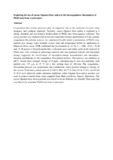Please use this identifier to cite or link to this item:
https://cris.library.msu.ac.zw//handle/11408/1741| Title: | Exploring the use of cactus Opuntia ficus indica in the biocoagulation–flocculation of Pb(II) ions from wastewaters | Authors: | Nharingo, Tichaona Zivurawa, M. T. Guyo, Upenyu |
Keywords: | Adsorption bridging, Adsorption charge neutralization, Ionic strength, Thermodynamics, Zeta potential | Issue Date: | 2015 | Publisher: | Springer | Series/Report no.: | International Journal of Environmental Science and Technology;Vol. 12, No. 12; p. 3791-3802 | Abstract: | Coagulation–flocculation processes play an important role in the treatment of water using inorganic and synthetic materials. Presently, cactus Opuntia ficus indica is explored as a cheap, abundant and eco-friendly bioflocculant of Pb(II) ions from aqueous solutions. The cactus powder was characterized by Fourier transform infrared spectrometer (FTIR), and the coagulation–flocculation process was optimized for pH, initial concentration of Pb(II) ions, particle size, dosage, ionic strength, contact time and temperature before its application to Mukuvisi River water. FTIR confirmed the involvement of –C–O–C–, –OH, –C=O, –N–H and –C–H groups of the polysaccharides, carboxylic acids and amino acids in the removal of Pb(II) ions. The variation of percentage removal and zeta potential with pH and flocculant dosage suggested the involvement of adsorption–charge neutralization and adsorption–bridging mechanisms in the coagulation–flocculation process. The process was optimum at pH 5, natural ionic strength, dosage of 8 mg/L, corresponding to zero zeta potential, with particle size <75 µm, at 35 °C for a floc settling time of 180 min. The coagulation–flocculation process was spontaneous and endothermic with a positive change in entropy of the system. Total heavy metal removal of 100 % (Pb), 85.74 % (Zn), 84.16 % (Cd) and 93.02 % (Cu) were achieved, under optimum conditions, when Opuntia ficus indica powder was used to remove metals from water sampled from Mukuvisi River, Harare, Zimbabwe. The cactus Opuntia ficus indica powder was found to be an efficient, eco-friendly flocculant that can effectively remediate Pb(II) ions from wastewaters. | URI: | ink.springer.com/article/10.1007/s13762-015-0815-0 http://hdl.handle.net/11408/1741 |
ISSN: | 1735-1472 |
| Appears in Collections: | Research Papers |
Files in This Item:
| File | Description | Size | Format | |
|---|---|---|---|---|
| Exploring the use of cactus .pdf | Abstract | 188.4 kB | Adobe PDF |  View/Open |
Items in MSUIR are protected by copyright, with all rights reserved, unless otherwise indicated.



